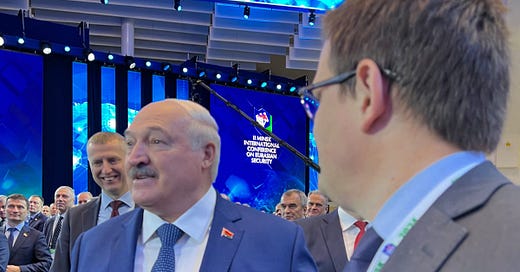I had the opportunity to attend the second Minsk International Conference on Eurasian Security. About 600 participants from 45 countries met to discuss the shift in the international distribution of power, diversification of economic partnerships, and the emergence of a new world order.
The second Minsk International Conference on Eurasian Security was recently held in the Belarusian capital. About 600 participants from 45 countries met to discuss the shift in the international distribution of power, diversification of economic partnerships, and the emergence of a new world order.
Belarus is an interesting case study of a state pursuing a multivector policy to maximise its political sovereignty. Belarus and Russia share a Union State, and the latter is evidently much more powerful than the former. Excessive reliance on an asymmetrical interdependent economic relationship can undermine political autonomy and even sovereignty itself. It has therefore been in the interest of Belarus to diversify its economic partnerships to avoid excessive dependence on its most important partner - Russia. Belarus thus pursued a multivector foreign policy by aspiring to have approximately a third of its trade with Russia, a third with the West, and a third with the rest.
However, Belarus is located in the border region of a divided Europe, together with Ukraine, Moldova and Georgia. As Europe preserved bloc politics after the Cold War rather than embracing an inclusive security architecture, a new Cold War logically has followed in which the West and Russia compete over where to draw the new dividing lines. Pulling Ukraine into the Western orbit against its will predictably resulted in civil war and a Russian military intervention, and Moldova appears to be next in line as the deeply divided society is forced to make an impossible choice of aligning with “us” or “them”. Georgia initially leaned towards NATO but has now taken a more pragmatic non-aligned approach to avoid ending up as a NATO frontline against Russia. Belarus is unique in terms of clearly falling on the Russian side of the ledger.
The West’s efforts to destabilise Belarus with sanctions and support for regime change has resulted largely in the economic decoupling from the West. Belarus is subsequently replacing Europe with China and other Eurasian giants to preserve its multivector foreign policy with diversification of economic partners. With the rise of BRICS and an alternative economic international system, an East-West divide intensifies in which a multipolar system is in competition with a unipolar system. Economic coercion, ranging from attempts to sabotage China’s technological development and stealing Russia’s sovereign funds, has created strong incentives to develop more reliable supply chains, transportation corridors, and financial institutions.
The economic decoupling of Belarus from the West is accompanied by the abandonment of Western claims to represent universal values, which legitimised a system of sovereign inequality. From China and Russia to India, the Eurasian powers argue for their distinctive values and that all states must be allowed to pursue their own path to developments and modernisation. The purpose of such international gatherings is therefore not for the West to socialise the rest towards universal values in a relationship between a “teacher” and a “student”, rather the purpose is a dialogue between civilisations. Democratisation is not rejected, although it is seen as a sovereign project that should not be outsourced or imposed from the West. With a war on its southern borders in Ukraine, and growing economic, political, and military hostility on its western borders from Poland and Lithuania, Belarus is carefully navigating its path towards Eurasian multipolarity.






The respect of Russia for Belarus’s proves the sincerity behind BRICS. Putin answering your daring question about countries in Europe joining BRICS with views reflecting an equanimity between peoples in real experiences to date with a yes I find entertaining.
Imagine a question from the fringe taken seriously.!
Hungary , Serbia leaving the EU gladly is easy to envision.
What if there are no nuclear weapons...
Remember all coming out of the Empire of Lies is just that, a lie...
I do no longer believe any of them have any nuclear weapons except dirty ones and bullets made out of enriched uran.